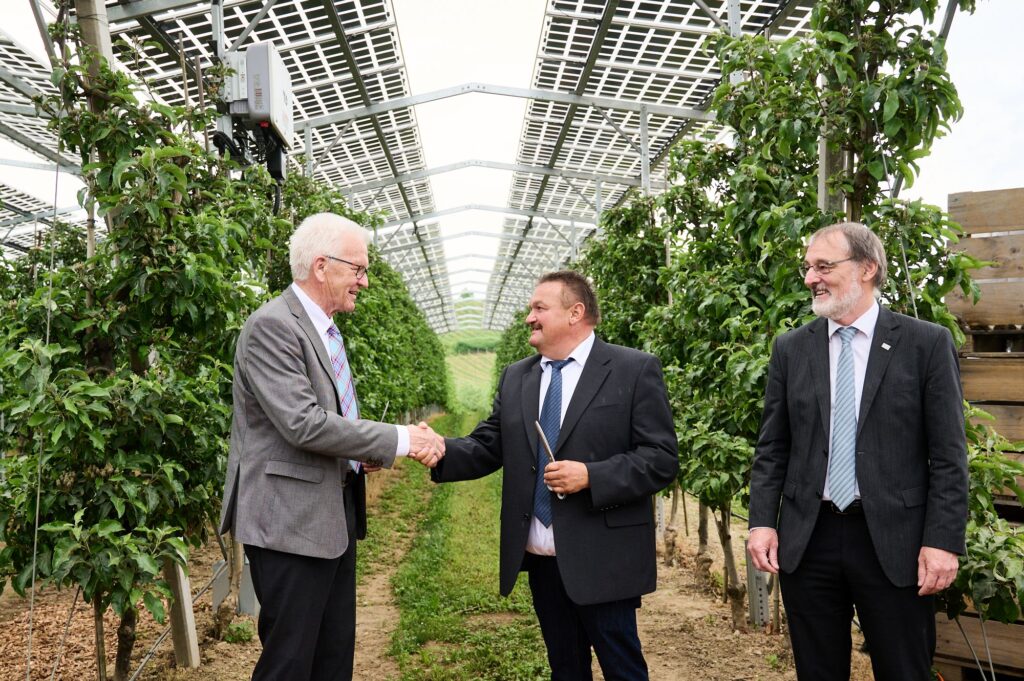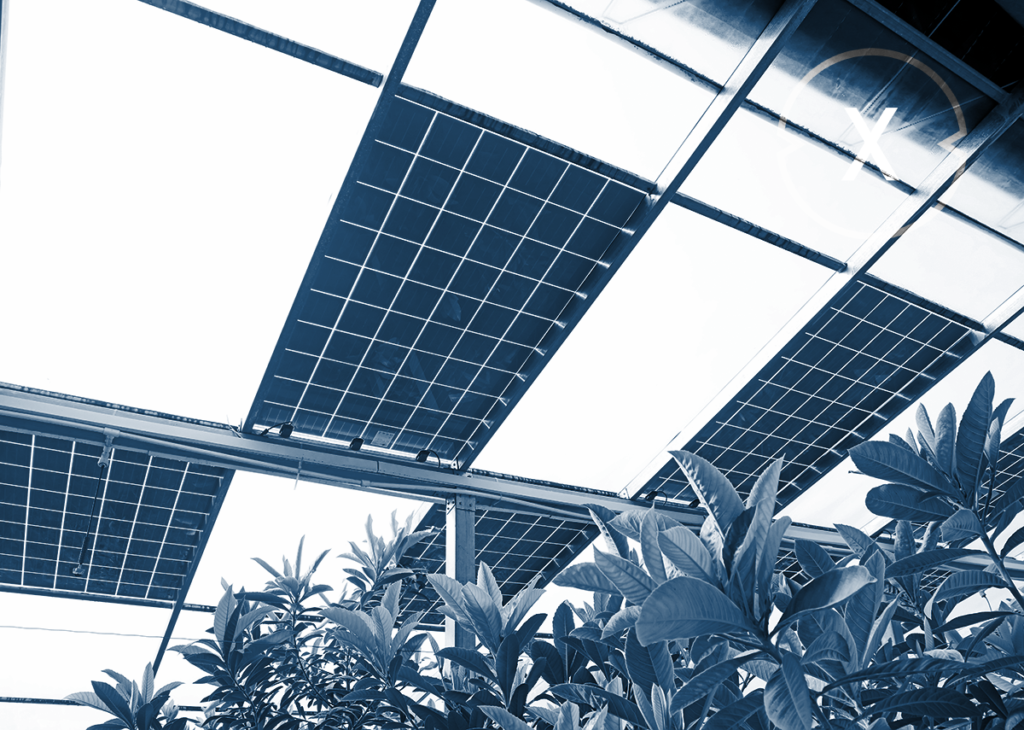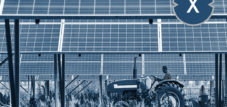Research facility of the “Model Region Agri-Photovoltaics Baden-Württemberg” opened by Prime Minister Kretschmann

Baden-Württemberg's Prime Minister Winfried Kretschmann, farmer Hubert Bernhard and Prof. Andreas Bett, head of the Fraunhofer Institute for Solar Energy Systems, inaugurated the agricultural photovoltaic system in Kressbronn. – Image: Fraunhofer ISE
As part of the research project “Model Region Agri-Photovoltaics for Baden-Württemberg”, the Lake Constance Fruit Growing Competence Center, the Fraunhofer Institute for Solar Energy Systems ISE and eleven other project partners are building and testing five Agri-PV pilot systems in Baden-Württemberg. Today, Prime Minister Winfried Kretschmann opened the facility above apple trees at the Bernhard fruit farm in Kressbronn on Lake Constance. The research project, which runs until 2024, is funded by the state ministries for the environment, climate and energy as well as for nutrition, rural areas and consumer protection. Within the project, the concept of agri-photovoltaics (agri-PV) will be examined in detail with a focus on pome and soft fruit in Baden-Württemberg.
The overall goal of the project is to answer open questions about the dual use of land for agriculture and solar power generation. With the development and construction of tailor-made pilot plants at five different locations with different fruit and berry crops, the feasibility of various promising areas of application and technologies is being examined and design variants are being researched. When planning the different system designs, initial experiences from the construction of an Agri-PV system for fruit cultivation in Rhineland-Palatinate were incorporated.
The researchers from the Bodensee Fruit Growing Competence Center (KOB) and Fraunhofer ISE are analyzing the plant growth under the modules in detail at the Agri-PV system in Kressbronn. “In addition to investigating the effects of varying shade on the growth and ecophysiology of apples, this also includes research activities on the effects of the use of pesticides on the PV modules,” explains Oliver Hörnle, project manager at Fraunhofer ISE. Dr. Ulrich Mayr, deputy managing director of the KOB, adds: "For us, Agri-PV is another important building block for sustainable fruit production on Lake Constance: protected and therefore safe and high-quality apple production with additional solar power production."
»We have been generating solar power on the roofs of our farm buildings since 2010 and asked ourselves: could we also produce electricity with the hail nets over our orchards? The result is the first Agri-PV system over an existing orchard. The built-up area is around 0.4 hectares in size and the system has a nominal output of almost 250 kilowatts," says farmer Hubert Bernhard about his motivation for providing cultivated land for the pilot system.
The first agri-PV system for CO2-neutral fruit cultivation is being tested in Rhineland-Palatinate
In the “Agri-PV Fruit Growing” research project, the Fraunhofer Institute for Solar Energy Systems ISE, together with other research partners, has built an Agri-PV research facility for apples and espaliered fruit at the Nachtwey organic fruit farm in Gelsdorf in Rhineland-Palatinate. It is the first facility of its kind in Germany. The total test area of the research project covers approximately 9,100 square meters; the Agri-PV system with an output of 258 kWp was installed on approximately a third of the area. The overarching goal of the project, which is funded by the Ministry for Climate Protection, Environment, Energy and Mobility of the State of Rhineland-Palatinate (MKUEM) and the Federal Ministry of Food and Agriculture (BMEL), is to increase climate resilience in fruit growing and ensure safe and sustainable apple production with additional solar power generation.
As part of the project, which will run for a total of five years, numerous research questions will be investigated using eight apple varieties.
The project first compares apple production at the same location under four different crop protection systems: film protection (not rain-permeable), hail protection (rain-permeable) and Agri-PV with permanently installed, translucent PV modules (not rain-permeable) and tracked PV modules (rain-permeable if necessary). Two different types of modules with differently arranged solar cells (strip or block pattern) are used. The aim is to investigate to what extent Agri-PV systems can protect plants and fruits from harmful environmental influences such as hail, heavy rain, sunburn, frost or extreme temperatures. In addition, it will be tested to what extent different light management through different PV module configurations affects plant growth and agricultural yields. Furthermore, the system should be examined with regard to landscape aesthetics, economic viability, social compatibility and plant cultivation parameters.
Stephan Schindele, Head of Product Management Agri-PV comments on the project: »We see Agri-PV as a long-term solution to help farmers adapt to the consequences of climate change. We can preserve the existing ecosystem and even upgrade it through synergy effects and solar power generation. After we have very successfully implemented professional berry cultivation under Agri-PV in the Netherlands, we are taking the important step towards espaliered fruit in Gelsdorf. We have recognized that the potential and synergies for Agri-PV combined with apples, pears, cherries, kiwi and other permanent crops can be considerable. We would like to develop this potential permanently and enable further expansion of photovoltaics without restricting agricultural yields.«
Economic benefits for farmers
In addition to adapting to climate change and protecting agricultural assets, the Agri-PV project in Gelsdorf also aims to demonstrate economic advantages for farmers. These sometimes include permanently lower and more predictable energy costs, lower investment costs in crop protection and lower operating material and waste disposal costs.
Andreas Steinhüser, deputy group leader for agri-photovoltaics at Fraunhofer ISE: “The research project 'Agri-PV fruit growing' is intended not only to show ways to reduce CO2 emissions in agriculture, but also to use short-lived materials and the use of plant protection products and fungicides avoid and thus make a decisive contribution to climate protection. In addition, we also focus on social issues such as acceptance and social compatibility, as these aspects will play a decisive role in the further spread of agri-PV.«
The electricity generated by the Agri-PV system can be used in the areas upstream and downstream of apple production. On the one hand, the battery-electric Fendt 100 Vario tractor provided by AGCO GmbH is charged with electricity from the system. On the other hand, the energy is also used to supply the irrigation system with its own Agri-PV electricity. The cold storage facility is already supplied with green electricity from a PV roof system. Overall, by implementing an operational energy concept, an attempt is made to significantly reduce CO2 emissions on the farm through solar electrification.
☀️🌾🌽🥕🍅🥒 Agri-PV for farmers and municipalities
Everything from a single source, specially designed for solar solutions for large agri-PV systems. You refinance or counterfinance into the future with your own electricity generation.
☀️🍅 For solar engineers
Advice and planning including a non-binding cost estimate. We bring you together with strong photovoltaic partners.
☀️🥒👨🏻 👩🏻 👴🏻 👵🏻 For private households
We are positioned across regions in German-speaking countries. We have reliable partners who advise you and implement your wishes.
- Plan photovoltaics for warehouses, commercial halls and industrial halls
- Industrial plant: Plan a photovoltaic open-air system or open-space system
- Plan solar systems with photovoltaic solutions for freight forwarding and contract logistics
- B2B solar systems and photovoltaic solutions & advice
Agri-photovoltaics: With Xpert.Solar Agri-PV – your individual strategic advice, planning and implementation
I would be happy to serve as your personal advisor.
You can contact me by filling out the contact form below or simply call me on +49 89 89 674 804 (Munich) .
I'm looking forward to our joint project.
Xpert.Digital – Konrad Wolfenstein
Xpert.Digital is a hub for industry with a focus on digitalization, mechanical engineering, logistics/intralogistics and photovoltaics.
With our 360° business development solution, we support well-known companies from new business to after sales.
Market intelligence, smarketing, marketing automation, content development, PR, mail campaigns, personalized social media and lead nurturing are part of our digital tools.
You can find out more at: www.xpert.digital – www.xpert.solar – www.xpert.plus


